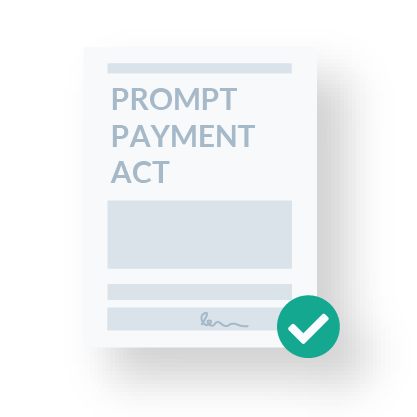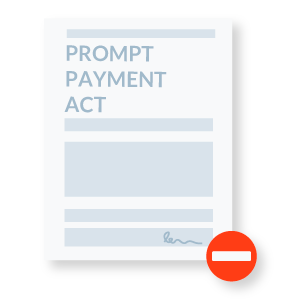Pennsylvania Construction Contracts
- Private Jobs
- Public Jobs
- Top Links
Lien Rights May Be Waived By Contract On Residential Projects
Generally, no-lien clauses are prohibited on construction projects in Pennsylvania. However, subcontractors may waive their lien rights on residential projects prior to performance.
Pay-if-Paid Are Enforceable
Pennsylvania has enforced pay-if-paid clauses as a condition precedent to payment on private projects if the terms are clear and unambiguous. If found to be ambiguous, then the clause will be treated as a pay-when-paid clause, setting a reasonable time for payment; regardless if the party has been paid by their hiring party.

Payment Timing May Be Modified
Generally, payments by owners must be made within 20 days of the end of the billing cycle or receipt of invoice; whichever is later. All other payments must be made within 14 days of receipt of payment from the higher-tiered party. However, these rules act as the default in case the contract is silent as far as payment timing. Thus, the terms of the contract will govern the timing of payments on the project.

Retainage Mostly Unregulated
Pennsylvania does not regulate the amount of retainage withheld on private projects, the amount withheld will be governed by the contract.
Pay-if-Paid Are Enforceable
Pennsylvania has enforced pay-if-paid clauses as a condition precedent to payment on public projects if the terms are clear and unambiguous. If found to be ambiguous, then the clause will be treated as a pay-when-paid clause, setting a reasonable time for payment; regardless if the party has been paid by their hiring party.

Payment Timing To Primes May Be Modified
The public prompt pay laws act as the default to prime contractors on public projects. If there is no payment timing provision, then payments must be made within 45 days of receipt of a pay app. All other payments must be made within 14 days of receipt of payment, or the date of the invoice; whichever is later.

Retainage May Not Be Modified By Contract
Retainage withheld on public projects is generally capped at no more than 10%, however, this may be reduced to just 5% after the project satisfactorily reaches 50% completion.
A construction contract outlines each party’s obligations, rights, and remedies on a project. But although the language in specific contract clauses is typically negotiable, Pennsylvania has certain rules that govern what the agreement must include — and what is prohibited.
Keep in mind that, while Pennsylvania’s rules for construction contract terms are written into state law, the courts determine how strictly those laws should be interpreted — and those interpretations can change.
On this page, you’ll find resources, legal information, and answers to frequently asked questions about Pennsylvania’s construction contract and payment terms requirements.
Pennsylvania construction contract provisions
While Pennsylvania generally allows construction parties to set the terms of their agreement, there are some laws that regulate specific types of contract provisions. Any contract clause that contradicts the law is invalid and unenforceable.
“No lien” clauses
Waiving the right to file a mechanics lien in Pennsylvania, also referred to as “no-lien clauses” are generally prohibited on construction projects. However, Pennsylvania does provide a unique exceptions to this prohibition. On residential projects, defined in PA as a residential building 3 stories or less, a contractor or sub may waive their right to file a claim by a signed, written instrument, or by “any conduct which operates equitably to estop such contractor from filing a claim.”
Contingent payment clauses
There are two types of contingent payment clauses: pay-if-paid and pay-when-paid.
Pay-if-paid clauses shift the burden of nonpayment to the subcontractor. In other words, such clauses create a condition precedent (payment from the owner) before the obligation to pay a subcontractor arises. Pennsylvania courts have enforced these types of clauses on both private and public projects, as long as the language clearly and unequivocally expresses the intent of the parties to shift the risk of nonpayment. If the clause lacks the required clarity, then it will be treated as a pay-when-paid clause.
Pay-when-paid clauses are enforceable in Pennsylvania as well, but are treated as a timing mechanism for payment, rather than a complete defense to payment. In other words, these clauses establish a “reasonable amount of time for payment,” and the underlying obligation to pay remains; regardless of whether payment was received or not.
Payment timing clauses
All private projects in Pennsylvania, with the exception of residential projects of 6 or fewer units, are regulated by PA’s prompt payment laws. Under these statutes, the timing provisions act apply as the default in cases where the contract terms are silent regarding the timing of payments. If this is the case, then payment from the owner must be made within 20 days of the end of the billing cycle, or 20 days from the receipt of the contractor’s invoice; whichever is later. All other payments down the contracting chain, when applicable, are required to be made within 14 days of receipt of payment by the higher-tiered party, or 14 days from when the invoice was received; whichever is later.
On the other hand, public projects valued at $50K or more also have prompt payment requirements, but agains, these act as the default rules when the contract is silent regarding payment schedules. If the prompt pay provisions do apply, payment by the public entity myst be made within 45 days after receipt of the contractors’ pay application. And all other payments must be made downstream within 14 days of the higher-tiered party’s receipt of payment.
Retainage limits
The amount of retainage that can be withheld on private projects in Pennsylvania is not regulated by statute. The amount that may be withheld on such projects will be dictated by the terms of the contract between the parties.
On public works projects, the amount of payments that may be withheld as retainage is explicitly capped at no more than 10% of each progress payment until the project reaches 50% completion. If satisfactory progress has been made at the 50% completion point, then the retainage withheld must be reduced to no more than 5% of the remaining progress payments. The amount withheld cannot be increased by an agreement between the parties.
Pennsylvania construction contract requirements
Generally, Pennsylvania does not require certain provisions to be included in a construction contract, favoring the freedom of contract between the parties. However, there are some key provisions that every construction contract should include. Additionally, if the project involves improvements to residential property in PA, the Home Improvement Consumer Protection Act will apply, which does have a number of required provisions in order to be valid. These include such things as the contractor’s name, address, phone number, and registration number, cost breakdowns, estimated start and completion dates, a notice of a right to rescission, and more.

